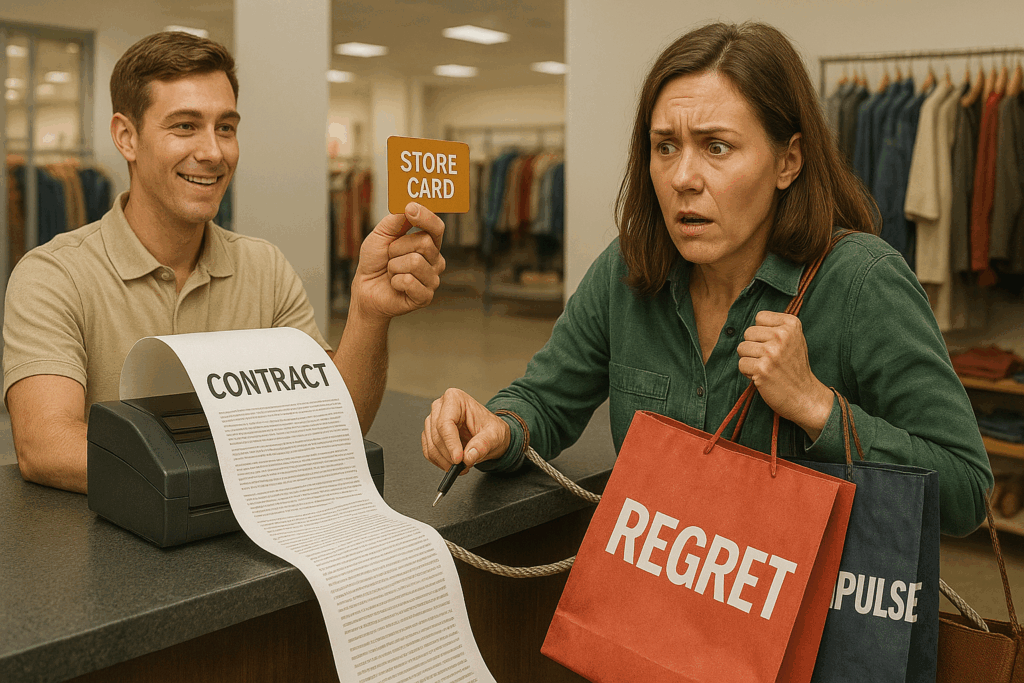Is a Store Credit Card Worth It? What to Know Before You Apply.

You’re at the register, ready to swipe your debit card, and then it happens:
“Would you like to save 15% by opening a store card today?”
It’s tempting. The discount is instant.
And if you’re doing some serious shopping (school clothes, holiday gifts, or a major haul) it can feel like a smart move.
But before you say yes and sign up, let’s talk about what a store credit card really is, how it affects your credit, and whether it’s actually worth it.
What Is a Store Credit Card?
Store credit cards are credit lines issued by retailers, usually through a major bank. They fall into two categories:
- Closed-loop cards — Can only be used at that specific store (ex: Old Navy, Kohl’s, Best Buy)
- Open-loop cards — Co-branded with a network like Visa or Mastercard, usable anywhere (ex: Amazon Prime Visa)
They’re usually easier to qualify for than traditional credit cards, which is why many people are offered them at the checkout counter.
The Pros of Store Credit Cards
There can be some perks, especially if you’re a frequent shopper:
- Instant discounts (like 10–20% off today’s purchase)
- Exclusive coupons or cardholder events
- Rewards programs for store purchases
- Opportunity to build credit if managed well
If you shop at a specific store all the time and you pay your balance in full? It can be a useful tool.
But most people don’t stop to read the fine print, and that’s where the trouble begins.
The Cons (And Why It Could Hurt You)
Here’s what they don’t always tell you at checkout:
1. High Interest Rates
Store cards often have interest rates in the 25%–30% range.
That 15% savings disappears quickly if you carry a balance.
2. Low Credit Limits
Store cards usually start with small limits: $300, $500, maybe $1000.
And if you spend close to that limit, it spikes your credit utilization, which can drop your score.
3. Hard Inquiry on Your Credit Report
Applying for a store card triggers a hard inquiry, which can lower your score a few points temporarily.
4. Temptation to Overspend
Having “store money” makes it easy to justify extra purchases.
Retailers want you to spend more, and it works.
How Store Cards Affect Your Credit Score
Store cards are real credit accounts. That means they impact your:
- Credit age (new accounts can lower the average)
- Inquiries (new applications = more inquiries)
- Utilization (if you carry a balance, it can hurt your score)
- Payment history (missed payments are reported just like any other card)
If you get the card, charge it up, and miss a payment or carry a high balance, it can do more harm than good.
So… Is It Worth It?
Here’s a quick checklist:
| Ask Yourself | If Yes… |
|---|---|
| Do I shop here often? | Might be worth it |
| Can I pay off the full balance every month? | Big yes |
| Do I have good credit already? | Helps minimize risk |
| Am I rebuilding or starting over with credit? | Be cautious |
| Am I only applying for the discount? | Probably not worth it |
If you’re using it strategically, and it won’t tempt you to overspend?
Go for it.
If you’re impulse-signing just to save a few bucks?
It might cost you more in the long run.
Final Thought
A store card isn’t free money. It’s a credit account, with all the weight that comes with it.
Yes, it can help build your credit.
But only if you use it wisely, pay it on time, and don’t max it out.
If you’re working to fix or improve your credit, start with intention and not impulse.
And if your score needs a tune-up before you apply for any card?
That’s where we come in.
Need help cleaning up your credit before opening new accounts?
At CreditNerds.com, we only charge when we get results, so there’s nothing to lose. Schedule your free consultation today.

